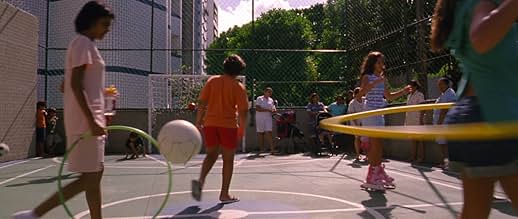Ajouter une intrigue dans votre langueThe lives of the residents of a Brazilian apartment building and the security guards who get the job guarding the surrounding streets.The lives of the residents of a Brazilian apartment building and the security guards who get the job guarding the surrounding streets.The lives of the residents of a Brazilian apartment building and the security guards who get the job guarding the surrounding streets.
- Director
- Writer
- Stars
- Prix
- 39 victoires et 23 nominations au total
- Mariá
- (as Mauricéia Conceição)
Avis en vedette
While this movie plays like a slice of life drama in a neighborhood in Recife, every single scene is carefully and meaningfully put together to speak about the nature of social structures in Brazil which date back to plantation times.
These things may be more discernible in Northeastern states like Pernambuco where the plantations once flourished and formed the basis of the societal constructs and defined human relationships, but their residue still permeates the country as a whole, which, while trying to move beyond them, still remains mired in the same kind of stratifications.
The film opens with black and white pictures of a plantation and then segues into a drama in 3 acts, using a crisscrossing narrative that delves into the day to day lives of various people who live and work on same street. And through their interactions and involvements we are given a very clear picture of class system as microcosm.
This film is more than a simple slice of life. For those of you familiar with the films of Lucrecia Martel (Argentina), what seems to be disconnected and inconsequential is put together like a jigsaw puzzle that leads brilliantly to the films final scene, at which point the entire story crystallizes before our very eyes, and we realize how well it has been supported and enriched by all we have been shown.
Throughout the film, there are narrative constructs for use to take hold of: the chapter headings, certain scenes that foreshadow, and a soundtrack the underscores where we are headed, without ever being exactly clear what we should prepare for. And this is, to a large part, the filmmaker's genius.
It wasn't really until the films Central Station and City of God surfaced (the latter of which gaining significant critical acclaim) that Brazilian cinema was once again seen as a powerhouse in independent and avant film-making.
Much like the aforementioned films, the themes of class and social attitude have pervaded the fabric of the modern Brazilian film, which has become increasingly acute in these perceptions and engaging in the issues of a country which, although rapidly growing and progressing, still faces basic problems of a social landscape that is far from the ideal.
The opening images of the film displays real life footage of slavery in Brazil, of the sugar-mills, where the origins of Brazilian society are thought to have come from.
The images are immediately effecting, and provide an historical and cultural backdrop upon which the film can build over, depicting a new Brazilian society that has not altogether eloped and emancipated itself from the old, allowing there to be a passageway for the viewer to see the intrinsic connection between past and present.
Neighbouring Sounds then drops us into the centre of a middle-class suburban housing residency, it's modern, clean and diverse; a seeming flagship for a prospering Brazil.
Beyond the haven of white walls and swimming pools lies the expansive vista that displays the city of Recife, with its high... www.ravechild.co.uk
Antonioni's own characterization of his 1960 masterpiece, L'Avventura, is a good fit for Filho's first feature, "Nothing," he said," appears as it should in a world where nothing is certain. The only thing certain is the existence of a secret violence that makes everything uncertain." Unlike many Brazilian films, this is not about favelas or drugs, but about the uneasy divide between a growing middle-class and their help living side-by-side in a crowded urban setting. Scenes are framed behind fences and grated doors to suggest maximum isolation, a suggestion that in today's Brazilian urban areas, a melting pot is built out of necessity, not of choice.
The film opens with a montage of black and white photos of workers in a sugarcane plantation peering into the camera with tools raised, and sweat accumulating on their faces from slaving in the fields in the heat of the day. The weary faces suddenly melt into the shot of a young girl on rollerblades in a parking lot surrounded by tall white-walled condos. Like Lucretia Martel's La Cienaga, Neighboring Sounds unfolds in a series of small incidents that convey an atmosphere of encroaching claustrophobia. Pointing to the local power structures that rule the streets, the block is run by the local "don," Francisco (W. J. Solha), a wealthy landlord with a questionable past. João (Gustavo Jahn), Francisco's grandson, is a real estate agent for the family who has established a promising relationship with Sofia (Irma Brown).
Accumulated incidents shape the film's message. João and Sofia are caught naked in their living room by the arriving housemaid Maria (Mauricéa Conceicão) who makes light of the incident, engaging in conversation with João and Sofia in the confining space of his kitchen. Bia (Maeve Jinkins), another nearby resident trying to raise two small children, is consumed by managing her domestic help, organizing English and Mandarin lessons for her young children, while drugging the neighbor's dog, amusing herself by smoking pot delivered to her by a drug-dealing water delivery man, and masturbating to the whir of the washing machine. Meanwhile, Sofia tells João that her CD player has been stolen from her car and asks for help to get it returned.
João immediately suspects his cousin Dinho (Yuri Holanda), a layabout who is used to getting what he wants and reacts aggressively when confronted. Sparked by the car theft and other recent incidents on the block, João hires a security patrol manned by Clodoaldo (Irandhir Santos) to oversee the neighborhood's safety. Though the residents of the block are relatively well off, they need more and more security but even then, do not feel safe in a country where there is a large disparity between rich and poor. The security patrol is ostensibly there to ensure the neighbor's safety, but accomplishes the very opposite when their true motives are revealed. As the accumulation of tension explodes in an illuminating burst of sound, the world ends not with a whimper but with a bang.
Le saviez-vous
- AnecdotesOfficial submission of Brazil to the Oscars 2014 best foreign language film category.
- Citations
Tio Anco: Do you carry weapons, Clodoaldo?
Clodoaldo: To be honest, I can't really say yes and I can't really say no. But I'll show you our best weapon, which is this: a cell-phone. Me and the boys have all the contacts we need.
João: So, worst-case scenario, you throw the mobile at the bad guy, is that it?
Clodoaldo: Mr. João, please...
João: Then you run home and get the real thing. I'm just trying to understand.
Clodoaldo: I get it, I get it.
- ConnexionsFeatured in Portraits Fantômes (2023)
- Bandes originalesCadavres En Serie
From the soundtrack of the film
"Le Pacha", by Georges Lautner
Music by Michel Colombier and Serge Gainsbourg
(c) 1968 SIDOMUSIC B. LIECHTI & CIE
Meilleurs choix
- How long is Neighboring Sounds?Propulsé par Alexa
Détails
- Date de sortie
- Pays d’origine
- Site officiel
- Langues
- Aussi connu sous le nom de
- Neighbouring Sounds
- Lieux de tournage
- sociétés de production
- Consultez plus de crédits d'entreprise sur IMDbPro
Box-office
- Budget
- 1 860 000 R$ (estimation)
- Brut – États-Unis et Canada
- 60 255 $ US
- Fin de semaine d'ouverture – États-Unis et Canada
- 12 666 $ US
- 26 août 2012
- Brut – à l'échelle mondiale
- 467 491 $ US
- Durée2 heures 11 minutes
- Couleur
- Rapport de forme
- 2.35 : 1





















